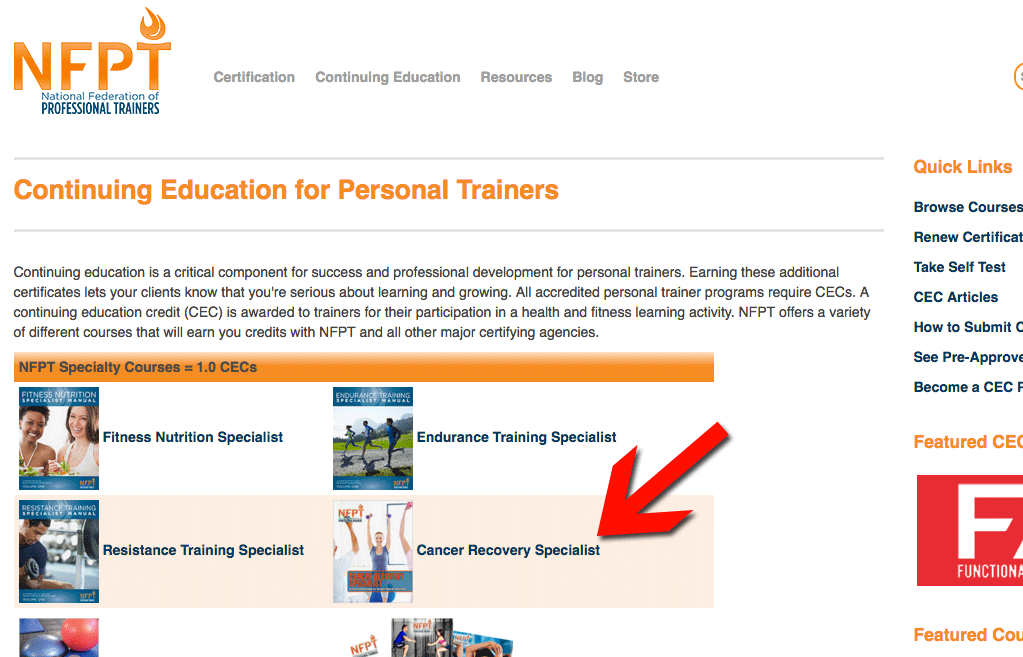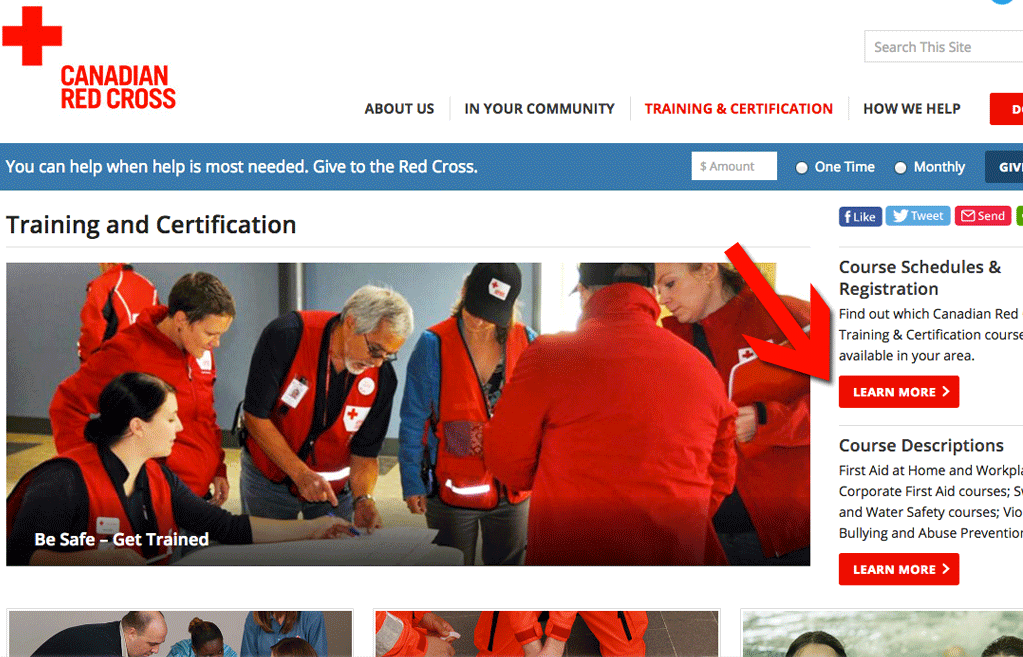


If these 5 statements apply to you then it’s time you consider becoming a personal trainer!
The first thing to understand about the personal training industry is that it’s unregulated. Unlike some other professions (e.g. nursing, accounting, teaching, etc.) that require a specific education and designation, anyone can call themselves a personal trainer, even if they have no experience or credentials.
At first, this might sound like a good thing since you could choose to start your personal training career right now. You have been exercising for years, so why not print up some business cards and get started today?
There are 3 excellent reasons why you should put on the brakes and choose to complete the best personal training certification (for you!) before you take on your first client:
1. I nsurance – Yes, you can visit clients in their homes, bring them to yours, or meet them in a public place (like a park) to begin their training sessions. It’s unlikely that anyone will ever question your qualifications, BUT operating as an uncertified personal trainer means that you are also uninsured .

You cannot obtain personal training insurance without proof of owning a recognized certification (this will be required during your insurance application process). Operating as an uninsured personal trainer is a VERY risky proposition!
Every workout you prepare, regardless of how safe you plan it, will be full of potential for serious client injury. Without insurance, you will personally be liable for any lawsuit that could arise as a result of such an injury. The risk is simply not worth taking.
2. Credibility – If you choose to operate as a sole proprietor, meaning that you work independently from any health club or fitness organization, there is little chance that anyone will ask about your qualifications. After all, your personal fitness (judged mostly by your appearance) is what clients often use to gauge your authority as a personal trainer.
However, there is a chance that an informed client will ask about your credentials. How will you answer that question honestly?
Or, you might have an opportunity to speak at an event, or write an article for a newspaper or magazine. How will you describe your credentials when they don’t really exist? Stating, “I’ve been working out for over 10 years” doesn’t carry much weight, even if you really do know your stuff.
3. Career Development – Let me be honest: Obtaining the best personal training certification will NOT magically transform you into a better trainer . In fact, what you know before you get certified, simply from your own experience in the gym, is likely more practical than much of what you will learn in a personal training certification course. But, becoming a certified PT will open many doors for future learning that will develop your career immensely.
"Certification" isn't the same as "Qualification" - Your experience is what makes you qualified.
Click to TweetAs you build your personal training business you will likely find that you work primarily within a specific niche. Maybe you will train runners, or new moms, or elderly clients, or busy business executives, or clients who are recovering from disease or operation…it doesn’t really matter who, but chances are strong that you will carve out a specific niche for yourself as a personal trainer.

In order for you to elevate your skills and value within this niche, you are going to want to learn. This is the mark of a top personal trainer: He or she is a lifelong learner who will always be looking for ways to improve the client experience.
Guess what? Formal education often requires certification. If you’re not certified, you’re out. This will limit your ability to become a true authority in your niche and will limit your business’s growth potential.
It’s clear that becoming a certified personal trainer is the way to go, but that leads to a whole new question: Which personal training certification is best?
Let’s look at the key considerations you must take into account before making your decision…
Getting your certification as a personal trainer is only helpful if it enables you to train the clients you really want to work with. Here are some key questions you should consider before making your choice:
1. What You Can Teach - Some certifications are specific for training clients one-on-one, while others include certification for small group training or even large group fitness instruction. Can you instruct all types of classes (e.g. Aerobics? Zumba? Spin? Etc.)
You might also want to ask if a certification (and/or your insurance policy) limits what type of equipment you can use with your clients. For example, some certification programs are designed specifically for PTs who want to lead TRX classes. Is that included in the certification program you are looking at?

And what about nutritional programming? Will you be qualified to prepare meals plans for your clients? Ask before you make your choice!
2. W here You Can Teach - Does you certification (and again, your insurance policy) qualify you to work with clients in their homes? What about at a fitness club? Can you take your clients outdoors? Could you train clients in a pool? Are you restricted to training in a Canada only? Or is the certification province-specific?
Some of these questions will be answered best by your insurance provider, BUT your certification provider should also know the answers to these questions and should be able to connect you with an insurer who can get you covered for every location you’d like to work in.
3. Providing Online Services - Online personal training has become very popular with trainers and their clients over the past few years. It allows the trainer-client relationship to bridge distance, and adds extra convenience for both parties.

Again, some certification programs are geared strictly to in-person services, while others are broad enough to include online PT. If you would like to supplement your in-person services with online components (e.g. travel workout programs, Skype calls or training sessions, digital tips and resources), it is worth asking about these options before you choose your certification course.
The old saying, “You get what you pay for” can certainly apply to personal trainer certifications. Yes, you can find courses for under $100 that can be completed online in a matter of hours (or minutes!), but please read the rest of this article before you jump on any of those low-investment, low-value options .

On the other hand, there are certification courses that cost thousands of dollars and require hundreds of hours of in-class and at-home study time. Does a high-investment course automatically mean it offers equally increased value?
While some of the lower end certification courses won’t even make you insurable, some of the more expensive options throw in a lot of fluff that might not pay out over the long term. Ask yourself these questions in order to make an informed decision:
When it comes to personal trainer certification courses, you get what you pay for!
Click to Tweet1. Prerequisites - The cheapest certification programs are usually online ones that are not very discriminating. Anyone with a credit card can become a trainer almost instantly.
More legitimate courses may have age restrictions and will almost always require CPR certification before you are given status as a certified personal trainer.
2. Location - Yes, it is convenient to be able to take a personal trainer certification course online, but what does that convenience cost you? Will your certification be insurable? Do other businesses and organizations in the industry recognize it as a credible certification?
On the flip side, travelling hours by car (or plane) to attend an in-person course really adds to your time and financial investment. There are some significant advantages of attending a course in-person: Y ou will learn in a more hands-on environment, you can ask questions directly to your instructor, and you can network with other prospective trainers . What value do you place on this in-person experience?
3. Examination Process - A legitimate personal training certification course will require you to pass some sort of exam to show that you’ve absorbed at least the most important concepts required to be an effective personal trainer.
Is that exam completed online or in-person? What types of questions are asked? Is there a practical examination (i.e. demonstrating your skills to a qualified master trainer) required? And, what happens if you fail to pass one of the examinations?

Simply showing up for the certification course isn’t enough. It’s important to know exactly what hoops you’ll have to jump through to earn your certification.
4. Pricing - It can be tempting to let the advertised price be a key deciding factor, but there may be financial costs beyond the base price. Are there study materials that have to be purchased separately? Does the course price include the exam or is there an additional examination fee?

Can you get your CPR certification at the same time as your PT certification?
5. Annual Fees - Less reputable personal training certification courses operate like factories. They want to get people in and out as quickly as possible (after taking your registration payment of course!) – it’s unlikely that there will be any follow-up or recurring annual fee.
Again, this might seem like a benefit, but you have to ask how this will affect your ongoing insurability, and the permanency of your designation as a “certified personal trainer.”
The more popular certification courses require annual fees to maintain your membership and designation. In addition, there will likely be other requirements you need to meet in order to re-certify each year. Keep reading…
6. Re-Certification - Would you feel comfortable going to see a doctor who graduated from medical school 30 years ago and hadn’t bothered to learn anything new about practicing medicine since? (I’d be looking for a new doctor!)
A great personal trainer is one who is ready to be a life-long learner!
Click to TweetThe same goes for a legitimately certified personal trainer. There are always new research studies, new exercise techniques, new nutritional approaches, and other important learning that will keep you up-to-date and providing top-quality service. That’s why many personal training certification courses require proof of continuing education, along with updated CPR status at a minimum.
In addition to all the “must-haves” that come with the best personal trainer certifications, there are a number of other bonus features or benefits that might sway you in one direction or another:
1. Upgrade Options - Once you’ve established yourself as a personal trainer, there is a chance that you’ll want to broaden your credentials so that you can expand your services. Will your certification make this an easy process?

For example, YogaFit Canada offers an add-on certification program for personal trainers who want to instruct yoga. Not all personal training certifications will be recognized for this upgraded certification course.
Think about where your career may be headed in the future , not simply where it will be within the next year or two. A little long-term planning now can save you much time and money going forward.
2. Networking Opportunities - Much learning and business development will come from networking with others in your industry. Valuable referrals, promotional partnerships, and joint ventures can be found this way.
Inexpensive online certification programs are unlikely to offer anything in terms of conferences or networking events that will allow you to grow your list of business contacts. Remember, many of those programs are in the business of getting you in and out, not helping you develop your career.

This is a major benefit of getting your certification through a reputable provider. For example, CanFitPro hosts the annual World Fitness Expo and CanFitPro certified personal trainers get special pricing and access to this conference.
3. Resources and Other Perks - There are many other perks offered by various certification programs. Some offer free online materials to trainers only, as shown below in the promo for the ACE certification program.

Other programs may offer discounts from partnering merchandisers, subscriptions to trade magazines, first dibs on registration for related events, and a host of other benefits.
Are these perks going to directly help you build a more successful career as a personal trainer? Maybe not. But, they do add value to the overall certification program and should be considered when making your final decision.
As you understand by now, there are a lot of different options when it comes to viable personal training certification programs.
Below you'll find a comparison of some of the most popular personal training certification programs. It is certainly NOT exhaustive, but it does offer some great courses for you to check out.
Which one fulfills the criteria most important to you?